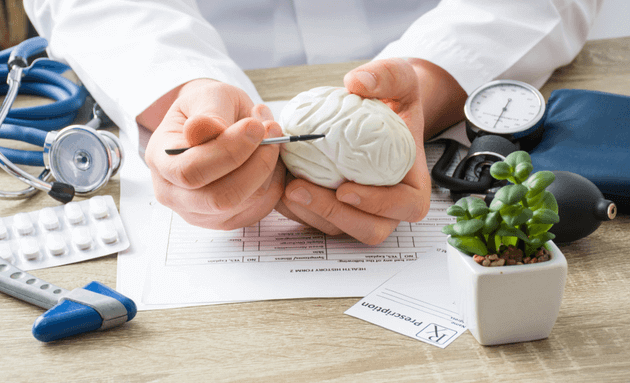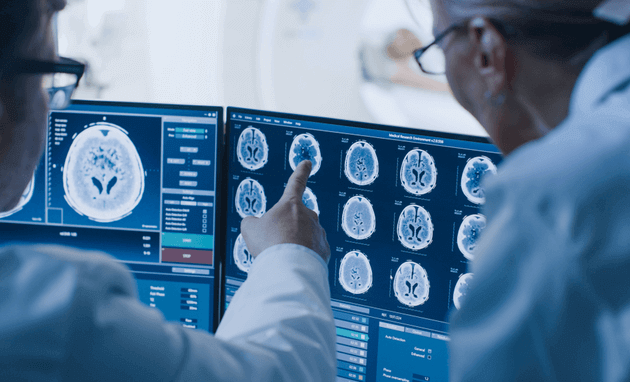What are the Causes, Signs, Symptoms and Treatment of Brain Cancer
Brain Cancer is an illness of the brain in which malignant cancer cells develop in the tissues of the brain. These cancer cells enlarge to create a mass of cancer tissues that interferes with functions of the brain such as memory, sensation, muscle control, and other normal body functions.
Cancer cells that develop from the brain tissues are known as primary brain tumours, and those that reach the brain from other parts of the body are called metastatic or secondary brain tumours.
More than 24,000 new cases of Brain Cancer is reported in a year in India, and the incidence has risen by 10% over the last few years. The reason behind rising cases of Brain Cancer can be attributed to exposure to carcinogenic radiofrequency waves from mobile phones, apart from genetic diseases like Neurofibromatosis.
What Causes Brain Cancer?

There are no specific reasons that can be pinpointed at for the development of Brain Cancer. However, below are some risk factors that have been attributed to Brain Cancer:
- Exposure to medical radiation such as Chemotherapy, X-ray, CT Scans of the brain can often lead to the development of cancerous cells
- History of cancer such as leukaemia or non-Hodgkin lymphoma can increase the chances of developing brain cancer in the later stages of life
- Family history or genetic diseases such as Neurofibromatosis can often lead to Brain Cancer
- HIV or AIDS increases one’s chances of developing Brain Cancer by ten times, possibly due to lowered immunity
- Obesity can also act as a risk factor for certain types of Brain Cancers
What are the Symptoms of Brain Cancer?
Brain Cancer does not show any specific early warning signs. However, the most common symptoms that one would notice are:
- Difficulty walking and feeling dizzy
- Muscle weakness, specifically in the arms and legs
- Severe and persistent headaches
- Seizures or fits
- Reduction in mental capacity or signs of poor memory
- Difficulty in speaking and comprehending or voice changes
- Hallucinations and blurry vision
- Nausea, vomiting and fatigue
- Reduced sensations of touch
- Change in alertness, weakness and/or sleepiness
Cancer can occur in any part of the brain, and although these symptoms in their individual capacities or in combination do not conclude Brain Cancer, they should be checked and diagnosed at the earliest.
What are the Treatment Options for Brain Cancer?

The doctor will perform a CT Scan of the brain to identify any abnormalities in the brain cells. Sometimes, a dye may need to be injected into a vein for a better picture of the brain cells. MRI or Magnetic Resonance Imaging is another method to diagnose anatomical changes in the brain.
After the diagnosis of Brain Cancer, the doctor will suggest different treatment methods, based on the stage, location, and complication status of brain cancer. Patients must discuss treatment options and methods they want to opt for before proceeding.
The most popular treatments for Brain Cancer are:
- Minimally Invasive Brain Surgery: If the tumour is located in a place that allows for minimally invasive surgery, the doctor will be able to remove as much of the tumour as possible. In other cases, if the tumour is located in sensitive areas in your brain, some amount of risk may be involved.
- Radiation Therapy: It used high-energy beams such as protons or X-rays to kill cancerous cells in your brain. There are two kinds of radiation therapy - External Beam Radiation which comes from a machine outside your body, or Brachytherapy, in which radiation is placed close to the tumour location inside your body.
- Radiosurgery: It uses multiple beams of radiations to attack the cancer cells and is a focused form of treatment. Each radiation in itself is not particularly powerful but enables a large dose of radiation at the point they meet at. Different types of technology such as a Gamma Knife or a Linear Accelerator are used in Radiosurgery.
- Chemotherapy: It uses drugs taken orally or through IV (intravenous) and aids in killing the tumour cells. Based on the type and stage of Brain Cancer, one will be advised Chemotherapy or not. The side effects depend on the dose of drugs you receive.
- Targeted Drug Therapy: Targeted Drug Therapy focuses on abnormalities within cancer cells and is administered for certain types of Brain Cancer. The drugs block these abnormalities and can cause cancer cells to die. Many more forms of targeted therapy drugs are being studied in clinical trials.
Rehabilitation may be necessary post-treatment for Brain Cancer. The disease can affect motor skills, speech, and memory, and the patient may need time and assistance to fully recover from this illness.
Occupational therapy, speech therapy, physical therapy, music and relaxation techniques, and support from the family will gradually help the patient recover and lead a better life. If you or your loved one has been diagnosed with Brain Cancer, you may have a lot of questions in mind to ask your doctor.






